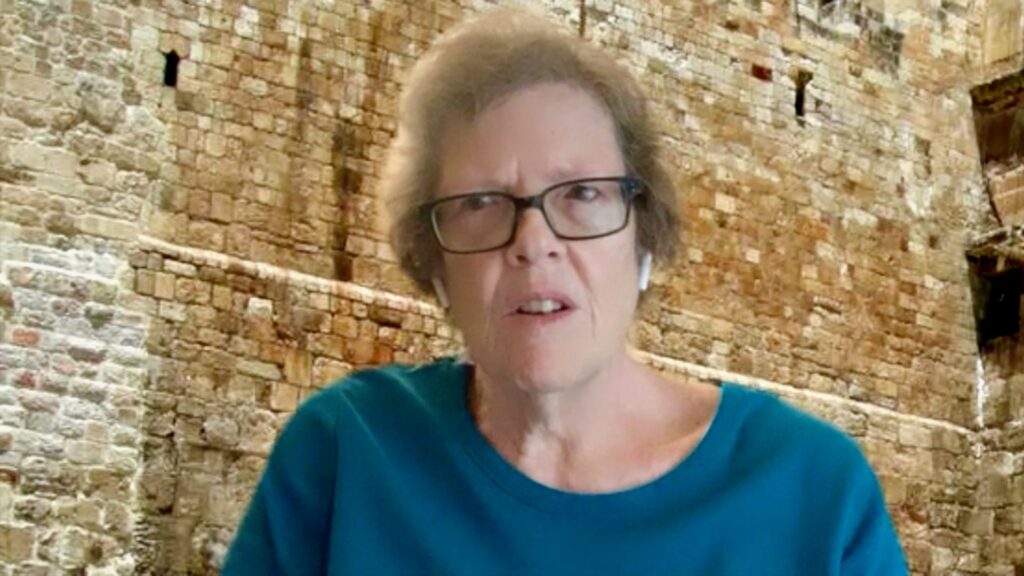The final installment in the series.

Full script will be posted Real Soon Now.
Yet Another Unitarian Universalist
A postmodern heretic's spiritual journey.
Here’s another environmental threat to keep you up at night:
“Nitrogen deposition and pollution is [a] more acute threat than climate change. … [But] few people are paying attention.” — Dr. Stuart Weiss, Chief Scientist of Creekside Science.
Weiss’s key paper on Bay Area nitrogen deposition, written while he was at Stanford, has a great title: Cars, Cows, and Checkerspot Butterflies: Nitrogen Deposition and Management of Nutrient-Poor Grasslands for a Threatened Species (Conservation Biology, v. 13 no. 6, Dec. 1999, pp. 1476–1486).
I’m listening to Weiss talk to the California Naturalist class I’m taking right now. Weiss makes some interesting points: Smog does an amazing amount of damage, not only to human lungs but also to non-human organisms. Non-native grasses are big contributors to the increase in pollen in recent times. Free-range cattle on California grasslands can keep non-native invasive grass species under control, providing habitat for endangered species as well as reducing allergens.
Dr. Sharpie takes Possum back in time to 2011, to Oakland, California….

As usual, full script is below the fold.
Continue reading “Possum learns more about protests”Dr. Sharpie uses her time machine to show Possum another historical protest….

Full script below.
Continue reading “Possum learns about protest, pt. 2”When Castor the Beaver asks Possum why he’s protesting, Possum decides to ask Dr. Sharpie why people protest. Sharpie fires up her time machine, and together they look at some protests from the Civil Rights Movement. It wasn’t quite what Possum was expecting….

Full script below; this week the script has not been corrected, and may diverge from the video.
Continue reading “Possum learns about protest”Unitarian Universalist congregations are receiving guidance from the denominational headquarters and regional staff to stay away from their buildings tomorrow, Sunday, January 17. The guidance says that right wing extremists are expected to be targeting state capitols with violent protests, and there’s a very small but non-zero chance that violence might spill over on to other targets. Regional staff says:
“If you have staff in your buildings over the weekend — perhaps to record your worship service — you may want to consider staying away for the weekend.”
Similar guidance has been offered for Wednesday, January 20, Inauguration Day. So if you were going to go down and sit in your congregation’s garden, or walk your congregation’s labyrinth — consider doing it on another day. Chances are really slim that your congregation’s building or campus will be targeted, but why take chances.
And probably best to not editorialize about this on your favorite social media outlets. The guidance we’re getting is — don’t engage in any way with the extremists. For that reason, I’ll disable comments for this post.
Last night, our congregation hosted an online class by John Buehrens on the women of Transcendentalism. John’s stimulating talk prompted me to go read some poetry by Transcendentalist women. I remembered some of the Transcendentalists I knew in Concord, Massachusetts, in the 1990s talked in glowing terms of the Sturgis sisters — Ellen Sturgis Hooper and Caroline Sturgis Dall — so I started with Ellen Sturgis’ poetry. And came across this:
Beauty may be the path to highest good,
And some successfully have it pursued.
Thou, who wouldst follow, be well warned to see
That way prove not a curvèd road to thee.
The straightest path perhaps which may be sought,
Lies through the great highway men [sic] call “I ought.”
This short Transcendentalist poem directly contradicts today’s typical notion that the Transcendentalists were a bunch of wild-eyed hyper-individualistic proto-hippies, bent on “doing their own thing.” Actually, none of them was; a few of them, like Emerson himself, pursued beauty as “the path to the highest good,” but that is quite different than being a hyper-individualist. From what I can tell, most of the nineteenth century Transcendentalists followed the path of duty, rather than beauty; these are the Transcendentalists who fought for abolition of slavery and women’s rights, and fought against poverty; they are better described as disciples of Immanuel Kant and his moral imperatives. I’d prefer to group myself with the Transcendentalists who follow “the great highway [of] ‘I ought’.”
Another of Ellen Sturgis Hooper’s poem struck me:
Hymn of a Spirit Shrouded
O God, who, in thy dear still heaven,
Dost sit, and wait to see
The errors, sufferings, and crimes
Of our humanity,
How deep must be thy causal love!
How whole thy final care!
Since Thou, who rulest over all,
Canst see, and yet canst bear.
Though Ellen was a Unitarian, this strikes me as a Universalist poem, because the phrase “thy final care” implies to me that Ellen Sturgis’s God plans to bring all souls into God’s embrace. Yet Sturgis also confronts head on the hardest thing to understand about universal salvation: there are certain people whom I would not want to extend ultimate salvation — such as the police officer who killed George Floyd, thus betraying both his public trust as a police officer, and his humanity — or the people who commit domestic violence — or the plutocrats who, to defend their ill-gotten wealth, fund and stir up Christian nationalists and white supremacists to destabilize U.S. democracy. Yet Ellen Sturgis’s God has a love for humanity that is so deep, that God can see humanity’s “errors, sufferings, and crimes,” and bear them, and still love. That’s well beyond my limited power, and I suppose that’s why people like me need to follow “the great highway [of] ‘I ought’.”
Ellen Sturgis Hooper died of tuberculosis in 1848, at the age of 36. Her poems were published in Transcendentalist periodicals during her lifetime. After her death, her son Ned printed her poems for private distribution, in an edition of just 8 copies. Several of her poems were also included in hymnals and anthologies.
I found little biographical information about her, aside from mentions of her marriage to physician Robert William Hooper, and her friendship with Margaret Fuller, and her relationship to famous men like William Ellery Channing, Nathaniel Hawthorne, and Henry James, Sr. However, there is a book-length biography of her daughter, Clover Adams: A Gilded and Heartbreaking Life, Natalie Dykstra (Houghton Mifflin Harcourt, 2012) which offers a brief but insightful biography of Ellen (see pp. 3-15).
Ellen’s father was a sea captain and co-owner of a large merchant trading firm; her mother was the daughter of a judge. At age fourteen, Ellen’s beloved older brother died in a tragic accident, an event that completely unhinged her mother, who in her grief was no longer care for Ellen and her other children. Ellen, as the second oldest child, wound up being mother to her younger siblings. At age 25, she was married to Robert Hooper in King’s Chapel, Boston, by Rev. Ephraim Peabody. Peabody said it was “one of the happy marriages,” and Dykstra writes, “Robert’s caution and his more retiring nature might have seemed dull to Caroline Sturgis [Ellen’s sister] and Margaret Fuller but appealing to Ellen, promising ballast after a tumultuous childhood.” She and Robert settled in Boston, living close to her father’s mansion, and close to her sister Anne who had married Robert’s brother, Sam. In 1839, Ellen and her sisters Caroline and Anne were part of the first of Margaret Fuller’s “Conversations.” Ellen lived close to Elizabeth Palmer Peabody’s Transcendentalist bookstore where the “Conversations” were held. Further connections to Transcendentalism came after both of the Hooper families joined James Freeman Clarke’s Church of the Disciples, when it was founded in 1841.
Although many other Transcendentalists became active in various social justice causes, such as abolition, Ellen followed her duty in another direction; according to Dykstra, “Ellen’s husband and three children were the heart of her life.” This makes sense, given Ellen’s experience of her own mother, who had in grief over the death of one child abandoned all her other children. After her third child and favorite child, Clover, was born in 1843, Ellen’s tuberculosis again grew worse. Ellen died in 1848, when Clover was only five years old, and before her death Ellen must have wondered and worried about what would happen to her children after she died. Who would be a mother to them, once she was dead? She found no easy religious or spiritual answer to such a difficult question. Ephraim Peabody, minister of King’s Chapel, who officiated at her funeral, wrote that in her last year of life she had become “almost a mystic.”
I’ll close with one final poem, which is undated, but perhaps came from the end of Ellen’s life:
One about To Die
Oh, melancholy liberty
Of one about to die —
When friends, with a sad smile,
And aching heart the while,
Every caprice allow,
Nor deem it worth while now
To check the restless will
Which death so soon shall still.
Another Jataka tale, as interpreted by Possum and friends:

As usual, the full script is below.
Continue reading “Jataka tale: The stupid crocodile”My crystal ball is cloudy, so once again I’m unable to predict the future with any accuracy, but I have some guesses about what the new year has in store for Unitarian Universalist congregations.
(1) The pandemic will continue to affect Unitarian Universalist congregations through summer, 2021. Dr. Fauci says we’ll see widespread roll-out of the vaccine by May, but not only will there still be plenty of unvaccinated people in June, most Unitarian Universalist congregations will be heading in to their summer slow-down. And I’m expecting a big slow-down this summer for many congregations. Making the transition back to in-person worship and programs is not going to be easy, as staff and volunteers have to be mobilized in different ways. Key volunteers and staff are also likely to feel a little burned out, and will want some down time in the summer. I’m betting most Unitarian Universalist congregations don’t make a full transition back to in-person worship and programs until September.
And when congregations do return to in-person worship and programs, how many people will come back? On the one hand, people will be eager to see their old friends again face to face. On the other hand, we’ve all slipped in to now routines and habit; how many people will take the time to get up, get dressed, and drive to their congregation, when for the past year and a half all they had to do to attend worship was roll out of bed and turn on the computer?
So I predict we’re never going back to the way things were before the pandemic, but I’m not willing to guess what the future holds.
(2) Money will be tight. Financially, I’m expecting the majority of Unitarian Universalist congregations will be in worse shape after the pandemic than they were before the pandemic. Many congregations that own buildings depend on rental income to some extent, and a year and a half with reduced rental income will wreak havoc with budgets. All congregations will doubtless experience some reduction in income due to the depressed economy. For congregations with staff, I’m expecting staff cuts, layoffs, and/or salary reductions.
For staff, this has the potential to get ugly. Some hypothetical scenarios: Instead of seeing their position get slashed to part time, parish ministers will convince congregations to cut religious educators and administrators instead; good potential for inter-staff conflict here. Employees will watch their benefits erode; potential for conflict between staff and lay leaders here. Custodial staff will get laid off, and contracted cleaning services brought in to partially replace them; the loss of hands-on services provided by dedicated custodians could prompt conflict between lay leaders and members of the congregation.
So I predict we’ll see cuts in programs and services, along with an associated increase in the number of congregations in conflict.
(3) Generational conflict looms. Baby Boomers (my generation) have been running most Unitarian Universalist congregations for the past decade or two, after they took over power from the G.I. Generation. It’s been a good run for the Baby Boomers, but increasingly I’m seeing the Millennials questioning the way things get done in Unitarian Universalist congregations. Here are two obvious ways to question the Baby Boomer way of doing things: We all have a growing awareness of just how white our congregations are, and the old familiar answer we Baby Boomers gave for years — “There are so few people of color who live near our church” — just doesn’t seem adequate any more. We Baby Boomers have been dragging their feet about livestreaming worship services and other programs, and now that we’re all livestreaming it’s become obvious just how backwards we were.
Here’s a less obvious way we should all be questioning the Baby Boomer way of running our congregations: We Baby Boomers watched as second-wave feminism reshaped big chunks of American society. Unitarian Universalism got radically reshaped by second-wave feminism — with the seven principles and the flaming chalice and two new hymnals — and we Boomers were right in the thick of that reshaping. But now we’re all beginning to realize that second-wave feminism, while admirable in many ways, was also an elitist movement driven by a myth of hyper-individualism and a racist movement that left out women of color. We’re also beginning to realize that second-wave feminism sometimes has transphobic tendencies.
Will we Boomers be able to address the deep flaws of second-wave feminism? Given how defensive we are as a generation, I have my doubts. I’m looking to an alliance between Gen X and the Millennials to find creative, productive ways to move forward. But given how we Boomers cling to power (e.g., every U.S. president since 1992 has been a Boomer), I’m not expecting that the creative solutions proposed by the Millennials and the Gen Xers will suffer from either passive or active resistance by us Boomers.
No prediction here; in my view, this is a long-term trend to keep an eye on.
(4) The number of children and youth will continue to drop in most Unitarian Universalist congregations. The number of UU kids has been dropping steadily since 2005; and denominational and district/regional staffing and support for children’s programming has been dropping over the same time period. As children and youth programs shrink, congregations feel justified in cutting funding, leading to a nice strong feedback loop. Pandemic-induced budget cuts will only accelerate this trend.
There’s a bigger problem here. Families today want more options for their kids. Because of this, one-size-fits all programs are a non-starter. Yet that’s what Unitarian Universalist congregations mostly offer: one-size-fits-all programs for kids. The “conservative” congregations offer Sunday school, the “progressive” congregations offer intergenerational worship; but really both these approaches are hopelessly conservative, because they’re both the kind of one-size-fits all program that worked in the 1990s, but won’t work today. If we don’t offer choice in programming, fewer families will bother to show up.
So I predict the number of Unitarian Universalist children and youth will decline even more steeply over the next couple of years.
(5) Livestreaming worship services will continue. This is my only positive prediction this year: most congregations are going to keep livestreaming once the pandemic is over, and that has the potential for extending the reach of Unitarian Universalist in some really interesting ways.
I predict that congregations that devote some serious effort to continuing and improving livestreaming of worship and programs are going to reap major — but unpredictable- benefits.
The gang go back in time to find out about Judah Maccabee.

As usual, the full script is below.
Continue reading “The story of Judah Maccabee”